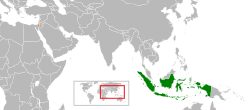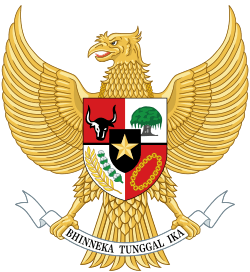Indonesia–Israel relations
 |
|
Indonesia |
Israel |
|---|---|
Indonesia–Israel relations refers to the historical and current bilateral relationship between Israel and Indonesia. The two countries maintain no formal diplomatic ties,[1][2][3] although they maintain quiet trade, tourism and security contacts. In 2012, Indonesia agreed to informally upgrade its relations with Israel and to open a consulate in Ramallah, headed by a diplomat with the rank of ambassador, who will also unofficially serve as his country’s ambassador for contacts with Israel.[4]
According to a 2014 BBC World Service Poll, 75% of Indonesians view Israel's influence negatively, with only 7% expressing a positive view.[5]
History
While not inherently opposed to Israel, Indonesia places a higher value on avoiding trouble with radical Islamist elements at home than it does on establishing relations with far-away Israel. The precedent was established by President Sukarno, who brushed aside early Israeli approaches and eventually adopted a strong pro-Arab policy as part of his anti-colonialist worldview.[7] The notable incident was the expulsion of Israel and the Republic of China (Taiwan) from the 1962 Asian Games held in Jakarta. Because of the pressure from Arab countries and the People's Republic of China, the Indonesian government refused to issue visas for the Israeli and Taiwanese delegations, thus refused the entry of delegations from Israel.[8]
In 1993, Israeli Prime Minister Yitzhak Rabin met Indonesian President Suharto at his private residence in Jakarta. This, what press said was Rabin's unscheduled visit, happened during Suharto's chairmanship of the Non-Aligned Movement and shortly after the Oslo Accords. This was the first ever high profile meeting between both leaders.[9]
In 1999, after the fall of New Order, Indonesian President Abdurrahman Wahid and Foreign Minister Alwi Shihab mentioned their wishes to open ties with Israel although only at the level of economic and trade links.[10] In 2002, Wahid explained his respect for Israel and posed a challenging "correction" to be addressed by his fellow Muslims:
Israel believes in God. While we have a diplomatic relationship and recognising diplomatically China and Russia, which are atheist states, then it's strange that we don't acknowledge Israel. This is the thing that we have to correct within Islam.[11]
However, after Wahid's removal from office in August 2001, no effort was maintained to improve the relations between Indonesia and Israel.[7]
In 2005, the Indonesian Government said that establishing full diplomatic ties with Israel will only be possible after peace has been reached between Israel and Palestine.[12] Israeli Foreign Minister Silvan Shalom held a discreet first meeting with his Indonesian counterpart Hassan Wirayuda during a UN summit in New York City in September 2005. However, President of Indonesia Susilo Bambang Yudhoyono ruled out establishing formal diplomatic ties but said: "Any communication between Indonesian and Israeli officials will be oriented to the objective of assisting the Palestinian people in gaining their independence".[3]
In July 2006, the Indonesian Government and several Indonesian Muslim groups condemned Israel's ongoing military operation in Gaza and demanded the release of arrested Palestinian officials.[2]
In a visit to Singapore in 2006, the Israeli Arab diplomat Ali Yahya called for direct ties between Israel and Indonesia. In an interview with the Jakarta Post he said,
I misunderstand why the relationship between the majorities of Muslims in Asia is hostile to Israel. If it is because of Israel and Palestine, then (how can it be reconciled that) we have peace with Jordan, Egypt, Morocco, but not with eastern Asia?We protect the holy places in Israel, respect the Arabic language, and bring imams and rabbis together to have discussions. I am posing a question if the Muslim countries in Asia can open the gate to their country for us, so that we can open up relations with them.
There are so many opportunities in Israel and by stressing the need for cooperation we would like to get these countries to also have a share of these opportunities. But to do that, we need to have the opportunity to talk directly to these countries, which I hope, will come up soon.[13]
During the 2006 Lebanon War, Indonesia called on Israel to withdraw its forces from Lebanon. The Indonesian Foreign Ministry advised that the national tennis team was pulling out of its Fed Cup matches in Israel saying "We are witnessing a military invasion by Israel and the arrest of scores of Palestinian officials...It is now impossible to play there".[14]
In 2008, the Jakarta Post printed a letter from Israeli Deputy Minister of Foreign Affairs, Majalli Wahabi, urging Indonesia to take a role in advocating for peace in the Middle East. Analysts suggested that the printing of the letter might be a signal of a thaw between the two nations.[15] However, the Gaza War that lasted from late December 27, 2008 to January 18, 2009 affected relations. Indonesia harshly condemned Israeli actions, labeling it as "aggression", and expressed its support of the Palestinians.
In March 2016, Israeli Prime Minister Benjamin Netanyahu called for normalization of ties with Indonesia, citing "many opportunities for bilateral cooperation" and adding that reasons preventing relationship between the two countries were no longer relevant.[16] However, Indonesia refused, stating that it will only consider normalization if Palestinian independence is fulfilled.[17]
Agreements
In 2008, Indonesia signed a medical cooperation agreement with Israel's national emergency medical service worth USD $200,000.[1]
In 2012, Indonesia agreed to informally upgrade its relations with Israel and to open a consulate in Ramallah, headed by a diplomat with the rank of ambassador, who also would have unofficially served as his country’s ambassador for contacts with Israel. The move, which had been agreed upon after five years of sensitive deliberations, would have represented a de facto upgrading of relations between Israel and the world’s most populous Muslim-majority country. Indonesia had formally presented the move to open a West Bank consulate as a demonstration of its support for Palestinian independence. In fact, while the ambassador-ranked diplomat was supposed to be accredited to the Palestinian Authority/PLO, a significant portion of his work would have been in dealings with Israel, and the office would have fulfilled substantial diplomatic duties as well as consular responsibilities. After Israel denied the Indonesian foreign minister entry to Ramallah in 2012, Indonesia backed out from the agreement and the consulate in Ramallah was not opened. Despite the absence of formal diplomatic relations, Israel and Indonesia quietly maintain trade, security and other relations which however have been quietly deteriorating ever since the Middle East Peace Process has been stalled.
Travel visas
As it has been for many years, Israeli citizens still can get visas to Indonesia for single entry group tourist travel. For Indonesians, tourist visas to Israel are only available for group travel through travel agencies. In recent years between 11,000 and 15,000 Indonesians have visited Israel yearly as pilgrims.[4]
See also
References
- 1 2 Muhammad Nafik (7 November 2008). "Representatives from Indonesia, Israel sign medical agreement". The Jakarta Post. Jakarta.
- 1 2 "Indonesia condemns Israeli offensive". The Jakarta Post. Jakarta. 3 July 2006. line feed character in
|title=at position 27 (help) - 1 2 "Indonesia rules out diplomatic ties with Israel, reaffirms pro-Palestine stand". Forbes.com.
- 1 2 Kayla J Adams (July 6, 2012). "Indonesia to informally upgrade its relations with Israel via ambassador-ranked diplomat in Ramallah, State of Palestine,". Times of Israel.
- ↑ "2014 World Service Poll" (PDF). BBC.
- ↑ "Israel's Skyhawk Scandal".
- 1 2 Rubenstein, Colin (1 March 2005). "Indonesia And Israel: A Relationship In Waiting". Jerusalem Center for Public Affairs. Retrieved 12 November 2015.
- ↑ "Jakarta 1962". Olympic Council of Asia.
- ↑ "Abstracts: Non-aligned and useful: Rabin meets Suharto in surprise stopover. Succession talk recedes: Suharto could lead into the 21st century - Business, international".
- ↑ "Controversy over Indonesia-Israel relations". The Jakarta Post.
- ↑ Jennifer Byrne (17 April 2002). "Interview with Abdurrahman Wahid". ABC.
- ↑ "Indonesia-Israel ties said "possible"". The Jakarta Post. Jakarta. September 20, 2005.
- ↑ Diplomat says Israel open to direct ties with Indonesia. BBC Monitoring International Reports| January 27, 2006 , Source: The Jakarta Post, Jakarta, in English 26 Jan 2006
- ↑ "Indonesia pulls out of Fed Cup tennis in Israel to protest Gaza". USA Today. 7 April 2006.
- ↑ "Israeli-Indonesian Entree", Dateline World Jewry, World Jewish Congress, July/August 2008
- ↑ Tamar Pileggi. "Netanyahu calls for normalizing ties with Indonesia". Times of Israel. Retrieved 29 March 2016.
- ↑ Desi Angriani. "Indonesia Rejects Israel's Normalization Call". MetroTV News. Retrieved 29 March 2016.

